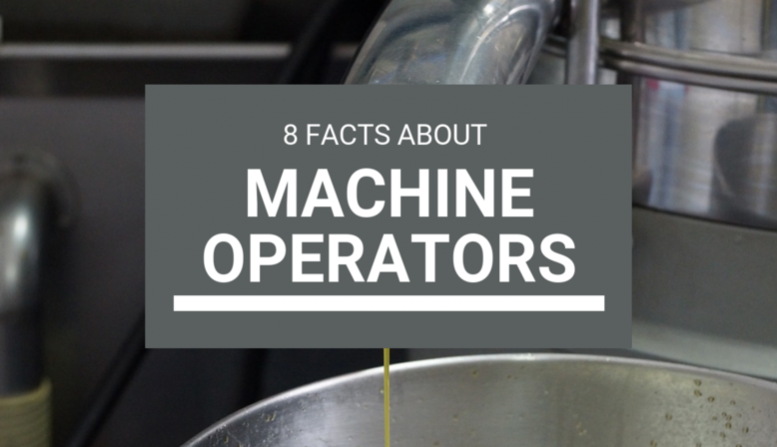8 Facts About Machine Operators
When you think of manufacturing plants odds are images of gigantic conveyor belts and equipment come to your mind. Equipment which is computerized, mechanical and made up of many different parts. Well these pieces of equipment can’t just run themselves, they need individuals who can set-up and operate them.
Who are the individuals who run these machines? Well that would be machine operators!
In order to get a grasp of the workers at the heart of the manufacturing industry FoodGrads is exploring the careers of machine operators. You will get the facts on the challenging, hands-on work of machine operators and they control nearly every aspect of the manufacturing process.
Table of Contents
1. Machine Operators operate machinery
Machine Operators (also known as production operators) are:
professionals who operate multi-function process control machinery or single function machines to process and package food or beverage products. They set up, maintain and disassemble their equipment based the on the requirements of a particular packaging job. Production operators perform necessary per-operational activities to ensure proper equipment startup and operation on multiple pieces of equipment. As well through-out the manufacturing run they keep a close-eye that the same conditions are observed through out.
Machine operators make sure their machines are working at full capacity, are stocked with the necessary materials and are well maintained. Doing so ensures that there is minimal downtime between the machines as downtime means the plant is not making money!
Finally, production operators rarely work by themselves and work in small teams within on their lines. Don’t forget they also work with quality control!
2. Machine Operators troubleshoot
If you talk to any machine operator you likely will hear that one of the most challenging parts of the job is troubleshooting equipment. The machines could have problems such as the weight of the product being higher than it should be. A machine operator may troubleshoot this problem by changing the settings by making adjustments to system components and run a test batch to determine if the changes have solved the issue.
If the issues are something the machine operator are unable to fix they will promptly communicate this with their production supervisor. To come up with viable option they may contact maintenance or even request a part from an outside company.
Troubleshooting is an important technical skill related to the machine operator job, and must be done on a regular basis to ensure the health and longevity of your machinery. If a problem occurs during a shift, your machine operator needs to know what needs to be done to fix it—and figure out the right procedure to do so in a relatively short amount of time. If your equipment is down for too long, it could result in damaging delays and setbacks in deadlines, making quick-thinking skills and troubleshooting a priority for your future employees.
To test the troubleshooting abilities of your potential candidates, you should create a scenario that they may run into during their daily activity that tests their critical thinking skills. You’ll get a better idea of how they perform under pressure, and how they might deal with an unexpected error in their workday.
3. Machine Operators have this education
In general, a production operator must have a minimum of a high school diploma or GED to qualify for the job. However, more specialized training may be necessary if the job demands working with high-tech equipment or machinery. Some companies provide on-the-job training so you don’t need the formal education. Operating machinery is a good role where some one can start and work their way up in a company. For example, you can start in production work up to a lead production hand and then production manager.

4. Machine Operators clean their machines
Machine Operators are required to clean their equipment and have it ready for a next production run. For example, if a manufacturing plant deals with various allergens on the same equipment the machine operator has to clean the equipment to prepare for the allergen switch over. This might be something as simple as doing a typical wash and sanitation. As well, they assist in other daily clean-up production duties such as sweeping the floors and taking out the trash.
5. Machine Operators work shift work
Many manufacturing plants have continuous operations which include days, night, afternoon, weekends and continental. It is not uncommon for machine operators to work different shifts depending on the production logs. It is usually only after working at a company for a while does an individual stick to a certain set schedule.
6. Machine Operators keep track of documents
Although machine operators spend a lot of their time running machines they also spend some of their time doing paper work. Production operators may be required to keep up with certain quality checks such as weight, percent oxygen and moisture content. Once they perform these quality checks they fill out the required forms. Furthermore, paperwork might include production logs to record how much product was actually produced in a day.
7. Machine Operators make quality issues
Quality assurance isn’t the only ones who help to ensure the quality of a product! Production operators evaluate the quality of a product as it proceeds through the production line by verifying product weight, colour, temperature and appearance in comparison to established parameters and quality markers. If they notice any issues, they will raise their concerns with their lead hand, supervisor and/or quality assurance personnel. They are the first line of defense so it is important that keep an eye out for potential defects.
8. Machine Operators have these set of skills
Being a production operator requires a range of skills however there are a few which are more essential than others. These skills include:
- Ability to work in a fast pace- Manufacturing plants are fast-paced environments and at times this can feel overwhelming. Machine operators are able to keep up in these environments because they are knowledgeable in their field. They also know the strength and weaknesses of their team members to help with the flow of their line.
- Attention to detail- It is necessary for machine operators to have an eye for detail because it ensures that operations run smoothly. If they do not pay attention to the detail, products could be made incorrectly, packaged in the wrong sized packaging or the be made in an unsafe manner.
- Good communication skills- To be an effective machine you need to be able to communicate information clearly. If they’re unable to communicate effectively about an issue in their department, it could result in a shortage of supplies, a broken down machine, or even a workplace related injury.
Author: Veronica Hislop Veronica is a recent FoodGrad working as Quality Assurance Technician at a snack food company. She graduated with a Chemistry degree at Ryerson University and has a passion for bringing awareness to sustainability in the food industry. When Veronica is taking a break from her food endeavours you will find her at home reading a great novel and playing with her cats.
Subscribe to our newsletter for details on mentorship sessions, workshops, webinars, as well as career and job fairs across Canada and the US!





Really remarkable article to read on. I’m truly amazed by this article. Looking for far more info. You have explained very well the job role of a helper and machine operator in an organization. Many folks who are looking for this info will definitely get benefits from this article. In this way, they will get themselves prepared to get the clarity on Machine Operator Job and responsibilities. Thanks again.